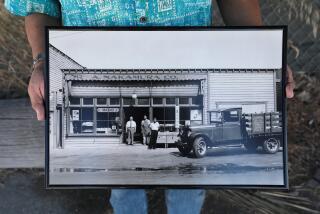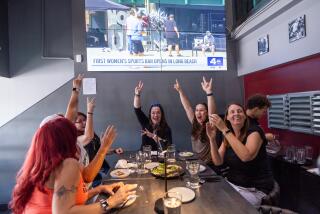Long Beach park honors women’s WWII contributions
The men and women — especially the women — who helped win World War II were remembered Saturday with a wreath-laying next to where wartime B-17 bombers and fighter planes were built.
The commemoration took place at Rosie the Riveter Park, an unusual three-acre interpretive center in Long Beach that honors women who worked at the Douglas Aircraft Co. plant and in other defense industries during the early 1940s.
Finishing touches were made last month on the $200,000 installation at the corner of Clark Avenue and Conant Street. Formerly named for the founder of Douglas Aircraft, the park was renamed in 2007 to honor the women of World War II.
It features a meandering walkway that serves as a virtual timeline of Long Beach’s response when women were recruited to work on production lines at the Douglas plant.
Dates and facts are inscribed on the walkway. “April 1941-June 1942 Douglas Aircraft Long Beach workforce grows from 950 to 18,000,” states one entry. “1943 Douglas Aircraft sends ‘Victory Boy Scouts’ door-to-door to recruit plant workers. Housewives and 16-year-old boys offered four-hour ‘victory’ shifts,” says another.
Signs and photographs placed on poles along the walkway offer more details as well as comments from women who labored on the fighter-plane assembly line. “My third finger was numb for three years after operating a riveting gun,” Eva Lowe is quoted as saying.
Visitors can use their cellphones to listen to explanations of events, such as artist J. Howard Miller’s creation of the famed “We Can Do It!” motivational poster in 1942 for Westinghouse Co. (You don’t even have to be in the park to hear the exhibits — just call (562) 257-3695 or visit lbrosie.com.)
The name Rosie the Riveter came to symbolize all 18 million women who took wartime jobs to replace men who had been called up to fight. It was coined in a song that made the Hit Parade in 1942 when sung by a group called the Four Vagabonds.
Creation of Rosie the Riveter Park was the idea of City Councilwoman Gerrie Schipske, who in 2009 wrote a book outlining Long Beach women’s contribution to the World War II effort. The dates and facts inscribed on the walkway and signs came from her research for the book.
Schipske pointed out that whereas the government was quick to encourage women to work during the war, it was just as quick to send them back home when men returned from fighting and reclaimed their old jobs. “I think women have been shortchanged when it comes to World War II history,” she explained Saturday.
The park’s timeline tries to correct that. It points out that in 1942, Long Beach housewives collected 37,000 pounds of fat and grease from their kitchens to turn into explosives, that in 1944 women working on production lines earned 65% of what males earned for the same job, and that in 1945 1 in 4 married women worked outside the home.
Saturday’s wreath placement was part of “Spirit of ‘45” ceremonies marking the war’s end in 1945. It continues Sunday at 4:30 p.m. with a dance featuring wartime swing music at the El Dorado Park Senior Center, 2800 N. Studebaker Road. Admission is free.
Schipske said President Franklin Delano Roosevelt is scheduled to attend — in the form of impressionist Peter Small.
More to Read
Sign up for Essential California
The most important California stories and recommendations in your inbox every morning.
You may occasionally receive promotional content from the Los Angeles Times.











